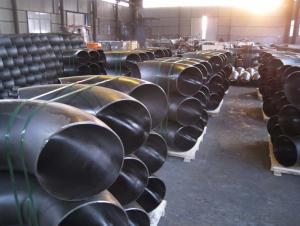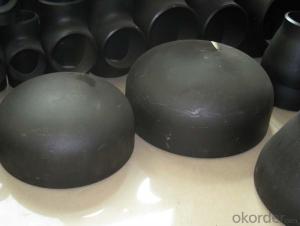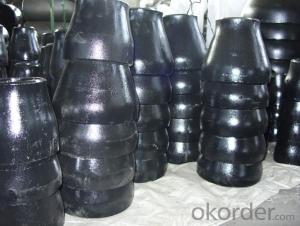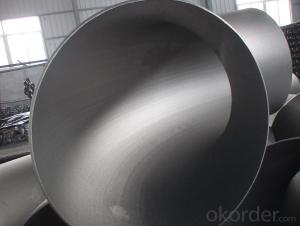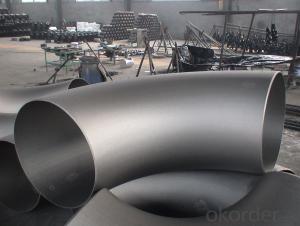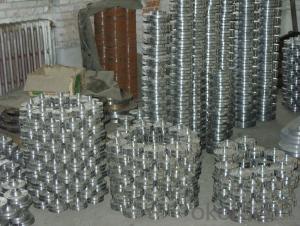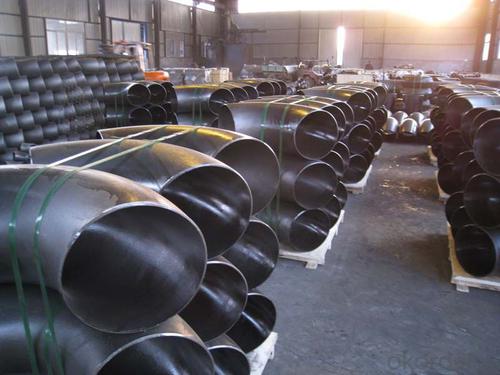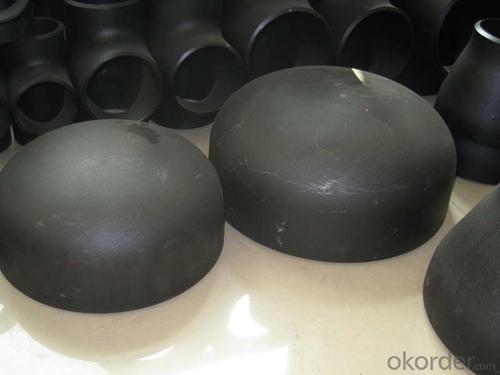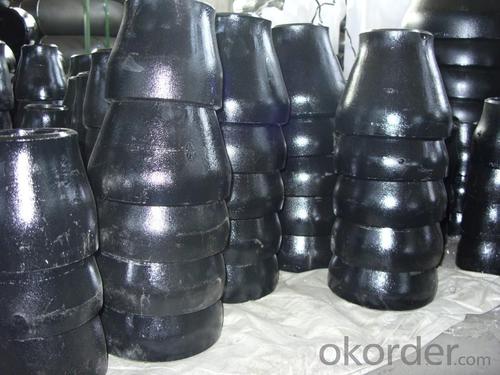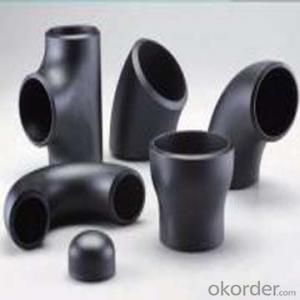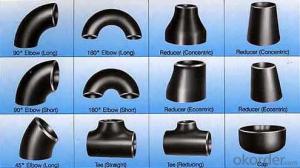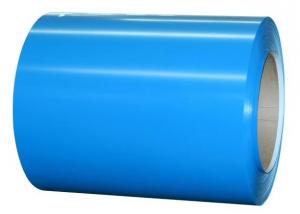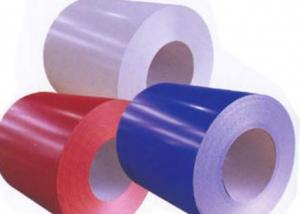Carbon Steel Pipe Fittings ASTM A234 BEND TEE
- Loading Port:
- China Main Port
- Payment Terms:
- TT OR LC
- Min Order Qty:
- -
- Supply Capability:
- -
OKorder Service Pledge
OKorder Financial Service
You Might Also Like
Specifications
pipe fitting elbow
Certificate:ISO:9001-2000
New material,completely meet asme and din standard
Best price
1. type: AISI ASTM A234 WPB BW Con Elbow
2. Size: 1/2"-48"(1/2"-24"is seamless and 26"-48"is welded)
3. Wall thickness: sch10-160, STD, XS, XXS
4. Material: A234WPB, A420WPL6, A420WP5, WP11, WP12, WP22, etc
5. Welding line: seamless
6. Angle of bend: 30, 45, 90, 180degree
7. Bending radius: SR, LR
8. Standard: ANSI B16.9, JIS, SB, DIN, GB
9. Surface treatment: black paint, vanis paint, black rust-proof oil,
transparent oil, hot galvanizing
10. Application: petroleum, electricity, chemical, natural gas, metallurgy,construction,
shipbuilding and other fields because of its high pressure, high temperature, etc
11. connection: welding
12. technics:forged
13.Certificate:ISO9001 - 2000, CE, SGS, etc.
14. packaging: wooden case, pallet, container or in accordance with the
requirement of customers
15. Principle: quality fist, customer first, credit first
16. payment: L/C T/T
17. delivery time: 7-25 days after payments
18. Notes: the bevel can be made in accordance with the special requirements
of the customers
19. Others: we can also produce the products according to the requirements
of the customers
The main production:
1. PIPE FITTINGS: elbows, tees, bends, reducers, cap, flanges and sockets etc.
2. PIPE: bult welded pipes, seamless pipes, threaded pipes, etc.
We sincerely welcom customers at home and abroad to visit us and seek common development.
- Q: How are steel products used in the construction industry?
- Steel products are widely used in the construction industry for various purposes such as structural components, reinforcement, and cladding. They are commonly used to construct buildings, bridges, and other infrastructure due to their high strength, durability, and versatility. Steel beams, columns, and frames provide the structural support needed for large-scale construction projects, while steel reinforcement bars enhance the strength and stability of concrete structures. Additionally, steel sheets and panels are used for cladding, roofing, and siding, offering protection against weather conditions and adding aesthetic appeal to buildings.
- Q: What are the different types of steel products used in the telecommunications industry?
- Some of the different types of steel products used in the telecommunications industry include steel pipes, steel towers, steel cables, and steel brackets. These products are crucial in providing structural support, transmitting signals, and ensuring the reliability and durability of telecommunications networks.
- Q: How is steel used in the production of industrial valves?
- Steel is commonly used in the production of industrial valves due to its strength, durability, and resistance to high temperatures and pressures. It provides the necessary structural integrity to withstand the demanding conditions these valves are subjected to. Steel can be used in various valve components such as bodies, bonnets, stems, and discs, ensuring reliable operation and longevity in industrial applications.
- Q: What are the different methods of joining steel components together?
- There are several methods of joining steel components together. Some common methods include welding, bolting, riveting, adhesive bonding, and soldering. Welding involves melting and fusing the steel components together using heat, while bolting involves using bolts and nuts to secure the components. Riveting involves using rivets to join the components by deforming and clinching them. Adhesive bonding uses specialized adhesives to bond the components together, while soldering involves melting a filler metal to join the components. Each method has its advantages and limitations, depending on factors such as the application, strength requirements, and ease of disassembly.
- Q: What are the different types of steel coils and their applications?
- There are several types of steel coils used for various applications. Hot rolled steel coils are commonly used in construction, automotive, and manufacturing industries due to their strength and versatility. Cold rolled steel coils are ideal for precision engineering, appliances, and electrical components as they offer a smooth finish and enhanced dimensional accuracy. Galvanized steel coils are coated with zinc to prevent corrosion and are commonly used in roofing, fencing, and automotive parts. Stainless steel coils are known for their resistance to corrosion and heat, making them suitable for applications in the food processing, medical, and chemical industries.
- Q: How are steel products used in the construction of shopping malls and retail centers?
- Steel products are used extensively in the construction of shopping malls and retail centers due to their strength, durability, and versatility. They are commonly used for framing and structural purposes, providing a robust and stable framework for the entire building. Steel beams and columns support the weight of the structure and distribute it evenly, allowing for large open spaces and flexible layouts. Additionally, steel is used for roofing, wall panels, and cladding, providing protection from the elements while enhancing the aesthetic appeal. Overall, steel products play a crucial role in ensuring the safety, functionality, and appealing design of shopping malls and retail centers.
- Q: What are the uses of steel in the construction of museums and art galleries?
- Steel is widely used in the construction of museums and art galleries due to its strength, durability, and versatility. It is used for structural purposes, including the frames and supports, allowing for large open spaces and flexible layouts. Steel also provides a secure framework for the installation of artworks and exhibits, ensuring their stability and protection. Additionally, steel is often used for the construction of roofs and facades, providing aesthetic appeal and allowing for the incorporation of large windows and natural light, which are vital for the display of artworks. Overall, steel plays a crucial role in creating functional and visually appealing spaces for museums and art galleries.
- Q: How is steel pipe coated for corrosion resistance?
- Steel pipe can be coated for corrosion resistance through various methods such as galvanization, epoxy coating, or fusion-bonded epoxy coating. Galvanization involves applying a layer of zinc to the steel surface, forming a protective barrier against corrosion. Epoxy coating involves applying a layer of epoxy resin to the pipe surface, providing a durable barrier against corrosion. Fusion-bonded epoxy coating involves applying a powder coating to the heated pipe surface, which then melts and fuses to form a corrosion-resistant layer. These coating methods help protect steel pipes from the damaging effects of corrosion, extending their lifespan and maintaining their structural integrity.
- Q: How are steel profiles used in the construction of underground tunnels?
- Steel profiles are commonly used in the construction of underground tunnels as they provide structural support and reinforcement. These profiles are used to create the tunnel lining, which helps to prevent the collapse of the surrounding soil or rock. Additionally, steel profiles can also be used as tunnel ribs or arches, distributing the load and ensuring stability. Overall, steel profiles play a crucial role in enhancing the strength and longevity of underground tunnels.
- Q: How are steel products used in the manufacturing of machinery?
- Steel products are used extensively in the manufacturing of machinery due to their strength, durability, and versatility. They are commonly used to construct machine frames, gears, shafts, and other components that require high strength and resistance to wear and tear. Additionally, steel is often utilized in the manufacturing of molds and dies, which are essential for shaping and forming various machine parts.
Send your message to us
Carbon Steel Pipe Fittings ASTM A234 BEND TEE
- Loading Port:
- China Main Port
- Payment Terms:
- TT OR LC
- Min Order Qty:
- -
- Supply Capability:
- -
OKorder Service Pledge
OKorder Financial Service
Similar products
Hot products
Hot Searches
Related keywords
